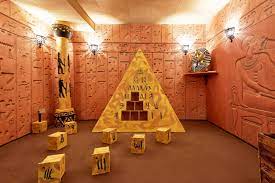Escape games have astonished the world, enchanting people of all ages with their vivid narrating and mind-bowing riddles. Past the rush and energy, there lies a fascinating psychology behind these enchanting experiences. Understanding how escape room games challenge and connect with minds offers significant experiences into human insight, critical thinking, and cooperation.
The escape games allows the members to experience into these complicatedly designed worlds, they are confronted with a progression of riddles that require a mix of decisive thinking, creativeness, and coordinated effort to unravel. This article explores the essential psychological principles that make escape rooms charming as well as intellectually strengthening, giving an enlightening look into the power of gamified challenges on the human mind.
-
The Intrigue of Uncertainty
Escape room games amaze minds with the intrigue of uncertainty, taking advantage of the psychology of challenge and engagement. These striking encounters challenge members to navigate through a confounding maze of riddles, puzzles, and hidden clues. The vulnerability of each clue’s of importance and the pressure of limited time push players to think critically, encouraging critical thinking abilities to reason and progressing mental adaptability. The allure lies in the fulfillment of conquering hindrances as a team, creating a sense of accomplishment and bonding. By stimulating interest and activating the thrill of the unknown, escape rooms give an extraordinary and enchanting platform for brains to explore, adjust, and win.
-
Cognitive Engagement and Problem Solving
Escape room games tap into the psychology of cognitive engagement and critical thinking, making them a convincing challenge for the mind. participants are pushed into vivid situations that require decisive reasoning, critical thinking, and coordinated efforts to succeed. The riddles and puzzles request a diverse set of abilities, like pattern recognition, logical deduction, and creative problem solving. The time-sensitive nature of these experiences intensifies concentration and motivation, setting off an ideal state of flow where participants become completely absorbed in the task at hand. Through this vivid engagement, escape rooms engage as well as invigorate mental agility, fostering a sense of accomplishment and satisfaction as players beat obstacles and unravel mysteries.
-
The Power of Collaboration
Escape room games harness the power of collaboration, tapping into of the psychology of human minds to present exhilarating challenges that captivate and engage. By placing participants in vivid situations that demand teamwork and communication, these games foster a feeling of collective problem-solving. The appeal lies in the intricate riddles that challenges participants’ cognitive capacities, creativity, and adaptability under pressure. As people work together, their minds synchronize, building a firm power that pushes them towards triumph. This collaborative element uplifts the sense of achievement as well as fortifies connections between players, making escape room undertakings a mentally invigorating and socially compensating experience.
-
Time Pressure and Adrenaline
Escape room games are awesome at taking advantage of the psychology of the human mind, utilizing time pressure and adrenaline to make captivating difficulties. The limited time period powers a need and sense of urgency, triggering the survival instincts and elevating participants’ focus and critical abilities to think. As the clock ticks, the release of adrenaline heightens, improving cognitive capabilities and boosting excitement. These experiences encourage camaraderie and cooperation, as participants team up to unravel complex riddles and defeat obstacles. The psychological appeal lies in the extraordinary blend of pressure and elation, making escape room games an engaging and remunerating mental experience.
-
Immersion and Flow States
Escape room games tap into the psychology of immersion and flow states, making them one of a kind in their capacity to challenge and connect with minds. The carefully created stories, intricate riddles, and meticulousness make a feeling of total immersion, transporting participants to a different world. As players become completely fascinated in the difficulties, they enter a state of flow, where time seems to fade away, and focus intensifies. This uplifted cognitive state enhances critical abilities to think and creativity, cultivating a deep sense of satisfaction upon completing each riddle. The blend of immersion and flow makes escape room games an intellectually invigorating and immensely enjoyable experience for all participants.
In the world of entertainment, escape room games stand apart as an exceptional combination of vivid narrating and psychological engagement. The appeal of escaping the real world and venturing into exciting situations challenges the human brain in special ways, cultivating the improvement of critical thinking abilities, creativity, and cooperation. As participants make efforts to unlock the mysteries within the confined spaces, they enter a state of flow, where their focus sharpens, and time dissolves into the background.
These experiences tap into the very essence of human curiosity and the innate drive to conquer difficulties, leaving players with a profound sense of fulfillment and an increased appreciation for the intricacies of the human mind. The psychology behind escape room games discloses the capability of gamified experiences to captivate, challenge, and enrich the human experience.

